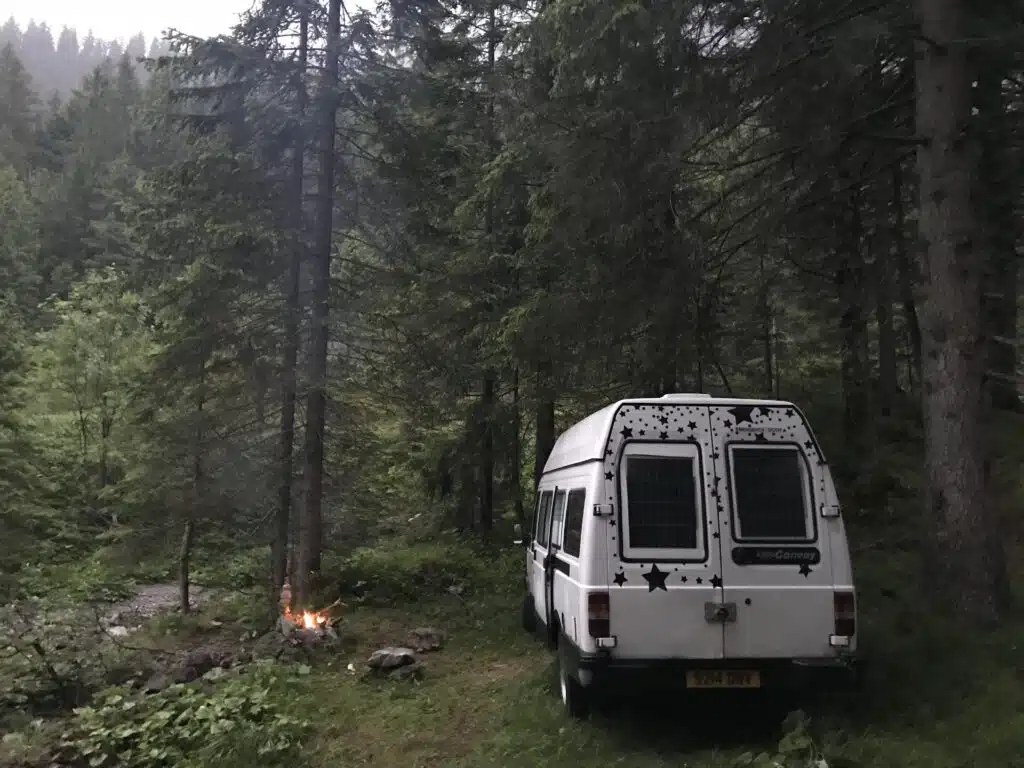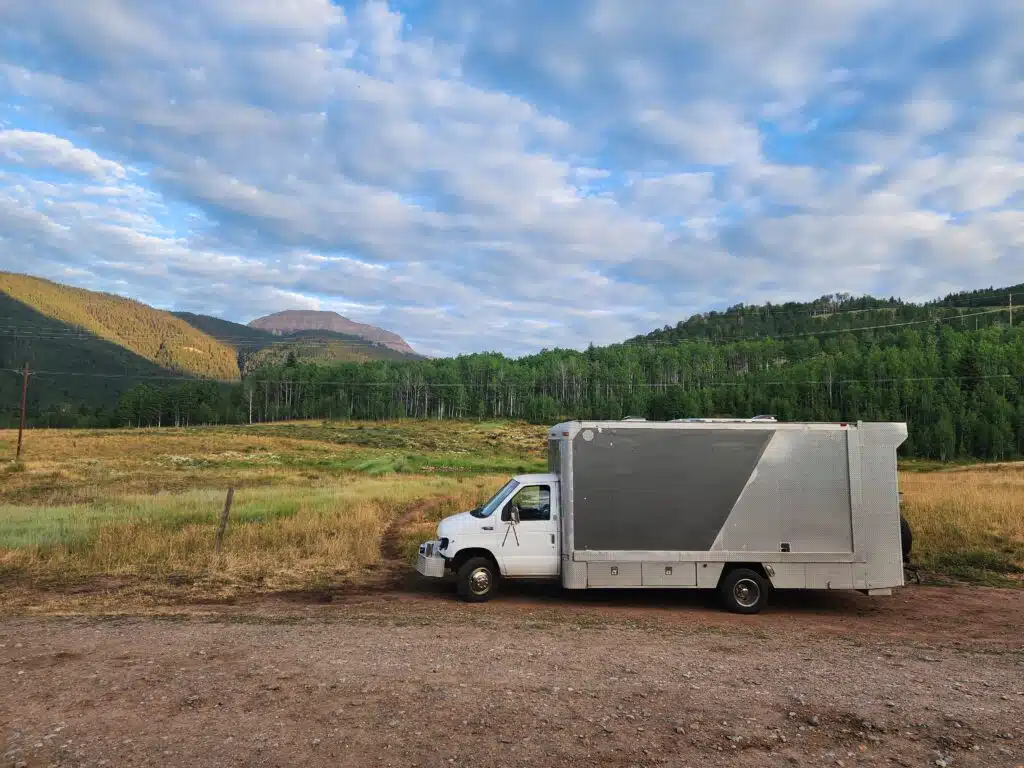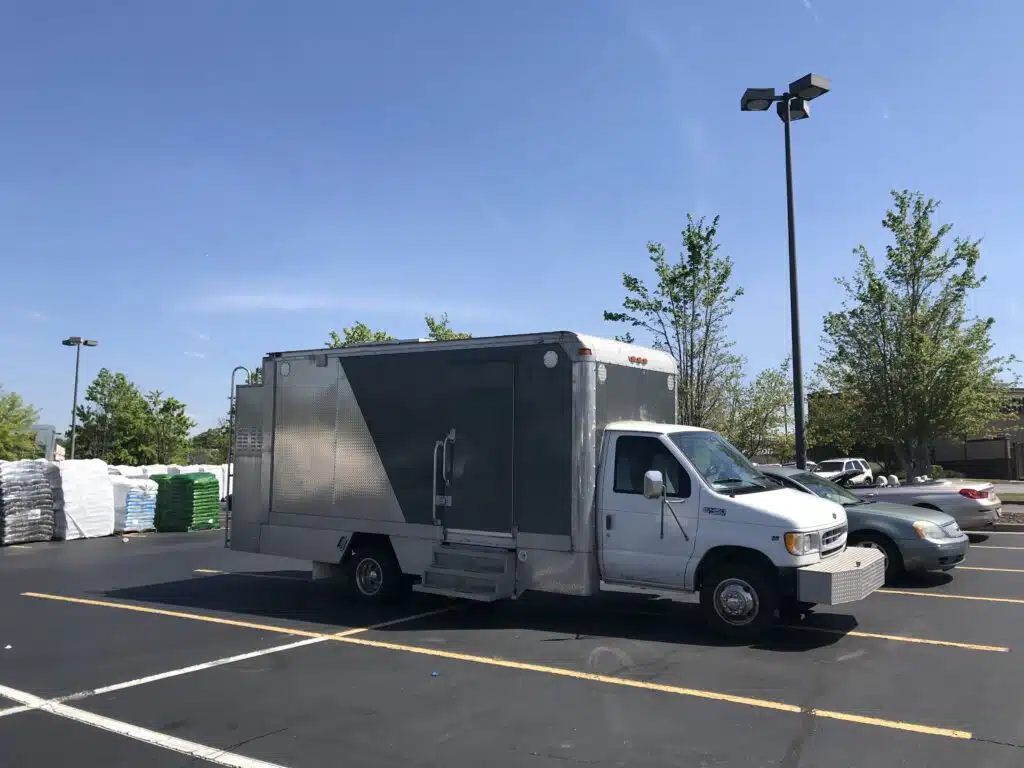Wandering into the vast unknown in your campervan or RV blends the excitement of discovery with the coziness of having a piece of home on wheels.
There really is nothing like it, is there?
It’s your freedom capsule, taking you from bustling cities to serene landscapes, all at your own pace.
However, as night falls and the road wearies, finding that perfect spot to park and catch some much-needed z’s becomes the day’s final adventure.
Understanding where you can park overnight isn’t just about scouting for a quiet corner to shut your eyes.
It’s much more—it’s about intertwining with local norms, respecting the environment, and yes, abiding by the law.
Every wanderer with a campervan knows this: not every parking lot or secluded roadside spot is a ticket to dreamland. There are rules, guidelines, and etiquettes to follow, ensuring your nomadic dwelling experience remains blissful and hassle-free.
When I first embarked on my campervan journeys, I’ll admit, I was a bit naive.
I thought I could just park anywhere that felt right.
A serene overlook? Why not!
A secluded beach parking lot? Sure!
However, reality hit when I was gently knocked awake at 2 AM by a local officer, kindly informing me I couldn’t park there overnight. Lesson learned.
Each area has its own set of dos and don’ts when it comes to overnight RV parking. Some locations welcome RVs and campervans with open arms, offering designated areas equipped with amenities. Others, well, not so much. It’s this patchwork of permission and prohibition that makes our travel tapestry so intriguing.
In essence, diving into the world of overnight parking in your campervan or RV is like learning a new language. It opens up a world of possibilities, adventures, and a few lessons along the way. With a bit of know-how, respect for local laws, and a dash of wanderlust, finding that perfect spot to park under the starlit sky is part of the joy of travel.
There are some neat tips and tricks you will pick up along the way but hopefully, this guide will get some of those ideas moving before learning the hard way.
Rules and Regulations for Parking Your Campervan Overnight
First, it’s paramount to recognize that regulations can vary widely across different territories, states, and even municipalities.
While one locale may welcome overnight campers with open arms, another might restrict this practice with well-defined signage or local laws. Always start by checking the specific rules for the area you plan to visit.
For example, in the Western United States, you may easily find BLM lands close to mountain towns where you can easily park and camp overnight without issue. If you try the same in Georgia, you might find overnight parking more difficult and public lands less accessible. Free camping on the East Coast can be much more challenging and limited to parking lots than the West of the Rockies public lands.
Public lands, managed by entities like the Bureau of Land Management in the U.S., often offer the most lenient policies for overnight parking. Here, adventurers can usually find a spot to rest without worry, especially in designated areas away from main roads or developed sites. Yet, while the call of the wild is inviting, it’s crucial to adhere to any posted guidelines to ensure these lands remain pristine for future travelers.
Conversely, urban environments present a different set of challenges. Many cities have enacted bylaws prohibiting overnight parking in certain areas, often to discourage long-term encampment or to maintain local aesthetics. Fortunately, some retail establishments, including certain big-box stores, have historically allowed RVs to camp overnight in their parking lots, though this is subject to change and always requires prior approval.
Lest we forget, overnight parking permissions at private campgrounds and RV parks are typically straightforward but come with a fee. These sites not only offer a secure place to rest but also provide amenities that can make your stay more comfortable, such as showers, electricity, and water hook-ups.
In essence, the golden rule for overnight parking in your campervan or RV is to always plan ahead. Seek permission when necessary, respect the land and its laws, and remember that every parking spot is a privilege, not a right. By treading lightly and following the rules, you ensure that the adventures ahead are as enriching as they are endless.
How to Find Free Overnight Parking Spots
Embarking on a journey in a campervan or RV conjures images of freedom, winding roads, and starlit nights. However, one question frequently pops up: Where can you find free overnight parking spots? Discovering these gems doesn’t have to be a puzzle, and I’m here to share the treasure map with you.
Initially, my ventures into van life had me a bit puzzled about where I could park without facing a fine or being nudged awake by a knock on my window. But, as I ventured more, I uncovered a few dependable strategies. Let’s dive into how to pinpoint those elusive, free overnight parking spots that can turn a good trip into an epic adventure.
First off, public lands are your friend. In the United States, the Bureau of Land Management (BLM) lands and National Forests are often open for dispersed camping. This means you can park your vehicle and camp for free in designated areas. These spots usually don’t have amenities, but they offer a tranquil experience with nature. Just always ensure to check the local regulations before setting up camp.
Another surprising ally in the quest for free parking spots are retail giants like Walmart and Cracker Barrel. Many of these establishments allow overnight parking for RVs in their lots. It’s a win-win; you get a place to sleep, and they potentially gain a customer. However, it’s crucial to go inside and ask for permission as a sign of respect and to confirm it’s allowed, as policies can vary by location.
Libraries, churches, and hospitals are often open to RVs parking overnight, especially if you explain your situation. In my travels, a simple conversation with a local or a business owner has opened up parking opportunities, coupled with advice on what to see in the area.
I cannot tell you how many times I have camped out in a church parking lot when I could not find any good public lands in an urban area. While parking lots aren’t the most glamorous, they sure help you get a good night’s sleep without camping on private property.
Apps and websites dedicated to the RV community can also be invaluable resources, offering user-contributed maps and reviews of free parking spots across the country. Utilizing these can save you a lot of guesswork and introduce you to spots you wouldn’t have considered otherwise.
iOverlander is probably the most popular option for finding good free overnight camping and has everything from paid campgrounds, and dump stations, to free dispersed camping.
Of course, finding a free overnight spot is not just about where but also about how. Always park discreetly, avoid taking up too much space, and follow the golden rule of leaving the place better than you found it. Through this journey, I’ve learned that finding these spots adds an exciting layer to traveling, making each night a unique chapter of your adventure story.
The Do’s and Don’ts of Overnight Parking in Rest Areas
Whenever I remember the excitement that lights up my eyes when I’m about to plan an RV trip, the question of where to park overnight always pops up. It’s a bit like solving a puzzle, isn’t it? And when it comes to solving puzzles, rest areas are pieces that have always intrigued me. They’re like those rare finds in a treasure hunt! That’s why I believe knowing the do’s and don’ts of overnight parking in rest areas is like holding a key to a secret garden – it just makes the adventure smoother and, dare I say, a bit more magical.
The Do’s:
1. Do Check Signage Carefully: I’ve learned, sometimes the hard way, that not all rest areas permit overnight parking. It’s crucial to look for signs and, when in doubt, ask around. I still remember the relief of finding a sign that nodded ‘yes’ to overnight stays after a long drive!
2. Do Stay Respectful: Keeping noise to a minimum and ensuring the area remains clean is just good traveler karma. It’s about sharing the space amiably with others and leaving it as pristine as we found it – or even a little better, whenever possible.
3. Do Consider Safety: Always park in well-lit areas if you can. I always like to thoroughly lock up and ensure my safety essentials are within reach. Peace of mind is priceless, especially when you’re on the road.
The Don’ts:
- Don’t Overstay: Typically, rest areas allow for a 24-hour stopover. It’s tempting to linger longer, especially when the scenery is a feast for the eyes, but remember, other travelers will need the space too.
- Don’t Set Up Camp: Setting up chairs, tables, or awnings might make it feel homier, but it’s a faux pas in most rest areas. It’s all about maintaining a low profile and ensuring that these areas remain accessible and welcoming for everyone.
- Don’t Ignore Local Laws: Laws can vary widely from one place to another. What’s permissible in one state might be a no-go in another. It’s always best to err on the side of caution and double-check.Reflecting on my own experiences, I’ve found these simple guidelines to be golden. They’ve not only helped me avoid potential hiccups but also made the journeys more enjoyable. After all, travel is as much about the places we rest our heads for the night as it is about our daytime adventures. Happy travels, and may your overnight stays in rest areas be nothing short of delightful!
Staying Safe While Overnight Parking in Your RV
Staying safe while overnight parking in your RV does not have to feel like navigating a dark, unknown forest. Instead, think of it as setting up your own cozy nook, under the stars, with a few smart precautions in place. I’ve had my fair share of nights parked under the vast, twinkling sky, and I’ve picked up some tricks along the way that have made each evening not just safer, but truly serene.
First up, always trust your gut feeling. If a spot feels a bit off, it probably is. I remember this one time, pulling into what I thought would be my home for the night, only to be greeted by a sense of unease that made my hairs stand on end. Needless to say, I moved on and found a much more welcoming spot a few miles down the road.
Keeping your doors locked is, of course, Camping 101. But, let’s add a little twist: always have your keys within arm’s reach when you sleep. This way, should you need to move in a hurry, you won’t be fumbling around in the dark.
Now, let’s talk about making friends with light. A well-lit area can deter unwelcome visitors, whether they’re of the two-legged or four-legged variety. However, you also don’t want to light up like a Christmas tree and disturb your neighbors or draw unnecessary attention to yourself. So, find that sweet spot – a bit of light to keep you secure, but not so much that you’re mistaken for a landing strip.
Lastly, nothing beats local knowledge. Chat up fellow campers or the staff at a nearby campground. They can offer insights into the best spots and those to avoid. On one of my journeys, a simple conversation with a local at a gas station led me to the most picturesque, safe spot by a lake, which I would have entirely missed had I not reached out.
In the vast, open roads of our beautiful country, safety and serenity can easily go hand in hand with a dash of preparation and a sprinkle of common sense. Happy travels and sweet dreams in your roving home-away-from-home!
Using Apps and Websites to Locate Overnight Parking
My travel adventures have taught me that finding that perfect spot to park overnight in a campervan or RV can sometimes feel like navigating a maze.
But, fear not! I’ve discovered a game-changer that can ease this task significantly: using apps and websites specifically designed to locate overnight parking. Trust me, it’s like having a personal travel guide at your fingertips.
First off, let’s talk about the variety of apps and websites out there. Platforms like Park4Night, Campendium, and iOverlander have been my go-to resources.
Each of these resources comes with its own set of perks. For instance, users can leave reviews about their overnight stays, which has often helped me set my expectations right and prepare accordingly. Finding spots with stunning views or essential amenities? Absolutely doable.
What’s particularly fascinating is how these digital helpers cater to every traveler’s needs. Whether you’re looking for a free spot just to catch some Z’s or a scenic location to spend a couple of nights, the filtering options are a godsend. I remember this one time I was desperately searching for a place with a good internet connection to catch up on some work—the app I was using led me to a spot that was nothing short of perfect.
However, a piece of friendly advice: while these tools are incredibly helpful, always double-check the latest reviews and updates. Conditions and regulations can change, and what was a welcoming spot a month ago could now have restrictions.
And here’s a little secret from my personal experience: engaging with the community on these platforms can lead to discovering hidden gems not listed elsewhere. The camaraderie among fellow campervanners and RVers is real, and people often share tips on secret spots that you won’t find on any map.
To sum it up, embracing the digital age and using these apps and websites has transformed my overnight parking experiences. It’s made my travels smoother, safer, and, frankly, a lot more fun.
Overnight Parking at Walmart: What You Need to Know
Walmart overnight parking. It’s a ritual as time-honored among road warriors as the morning cup of joe.
Let me share with you what I’ve learned through my own travels and several lively chats with fellow campervan enthusiasts. Parking your home-on-wheels at Walmart is not just about saving a few bucks; it’s about the sense of community, the convenience, and sometimes, the adventure of it all.
First things first, it’s crucial to understand that not all Walmarts are created equal in the eyes of the weary traveler seeking a spot to rest. While many of these retail giants warmly welcome RVs, campervans, and travelers of all stripes to use their spacious parking lots for a night of Z’s, this isn’t a blanket policy.
Some locations, due to local laws or store policies, don’t allow overnight parking. My first bit of advice? Always, and I mean always, call ahead or check in with customer service upon arrival to get the official thumbs up.
What’s super cool about this option, aside from being easy on the wallet, is that you often find yourself in the company of other like-minded travelers. I’ve swapped stories, tips, and even a cup of sugar more than once under the gleam of those iconic store lights. But, it’s not a free-for-all. Here are a couple of golden rules to ensure your stay is both welcome and possibly repeatable:
- Stay tidy: Keep your parking spot cleaner than you found it. It’s basic manners, really.
- Keep it stealth: This isn’t the place for awnings, chairs, or grills. The less it looks like you’re setting up camp, the better.
- Mind the time: Arriving late and leaving early is part of the unspoken campervan code of honor here.
In my journeys, I’ve found that using Walmart’s parking lot for a night can be a lifesaver, especially when those scenic spots are all taken, and you need a safe spot to rest.
Remember, though, it’s about mutual respect. We’re guests in their lot, and acting as such ensures this symbiotic relationship continues. Happy travels, and who knows, maybe I’ll see you out there under those bright store lights, sharing tales of the road.
Other Common Urban Camping Options
Planet Fitness
Many people have reported that Planet Fitness is a great option for those who have a membership and arrive late and leave early. While it is not recommended to stay there longer than a 24 hour period – it could be a great option in a pinch.
Camping World
While each store parking lot may have different policies, many Camping World stores allow overnight parking which can be excellent for those who also want to stock up on needed items for their van or RV.
Casinos
Almost every casino I have been to has welcomed overnight camping with open arms. There are designated areas to stay overnight at almost all casinos because hey – they want your gambling money.
Truck Stops
Truck stops are usually a safe bet for overnight camping and I have never had a problem with leaving a vehicle overnight.
I usually tuck my RV in a spot hidden within semi-trucks just to avoid any sort of attention.
Bass Pro Shops & Cabelas
These outdoor stores often have overnight camping-friendly parking lots but it can be a bit tricky if they share parking lots with other department stores. Make sure to check with each store and the local ordinances beforehand.
Costco & Sam’s Club
Many of these stores are RV-friendly if you are looking for a quick parking lot during urban camping.
Cracker Barrel Restaurants
Surprisingly enough, many Cracker Barrels are RV and vanlife friendly although you should check the local laws to see if overnight parking is prohibited in the area.
Staying Overnight at a Rest Area
I do not recommend rest areas for overnight parking. You leave yourself in a position to have the cops called if someone gets suspicious (as it has happened to me before!)
If you need to rest for a few hours – great, but be careful if you want to stay there for the whole night.
Tips for Boondocking with Your Campervan
1. Plan Ahead:
Before you set off into the sunset, it’s crucial to have a game plan. Research the area you intend to stay in. Know the local rules and if permits are required. The allure of spontaneity shouldn’t leave you unprepared or in a tight spot legally.
2. Water and Waste:
Ensure you have enough water for your stay, and plan for waste disposal. This is where being prepared really counts. Leaving no trace behind means thinking ahead about how to manage your waste, including the not-so-glamorous aspects of travel like where to dispose of it responsibly.
3. Power Up Smartly:
If you’re relying on solar panels for power (and you should, they’re brilliant), make sure they’re fully charged and functioning well. This is your lifeline for keeping your lights on and your essentials running.
4. Stay Discreet:
Part of the joy of boondocking is blending into the environment. This means keeping noise to a minimum and ensuring your setup isn’t sprawling across nature’s living room. Think of it as being a polite guest in the vast home of Mother Nature.
5. Safety First:
Always let someone know about your travel plans, especially when heading into more remote areas. A simple check-in can make all the difference in safety.
6. Leave No Trace:
This mantra cannot be overstated. Take out everything you bring in, respect wildlife, and maintain a safe distance from animals. Our enjoyment of the wild places shouldn’t compromise their pristine nature.
Boondocking presents a unique opportunity to connect with nature intimately and sustainably. I’ve found that following these guidelines not only ensures a smoother adventure but enriches the overall experience. Whether it’s waking up to a glorious sunrise in utter solitude or enjoying a serene sunset without a soul in sight, boondocking has woven some of the most memorable narratives in my travel tapestry. And with a little preparation and respect for nature, it can do the same for you.
Leaving No Trace: Respecting Nature While Parking Overnight
Leaving no trace is more than a principle; it’s a commitment to respect and protect the earth, a promise that when we depart at dawn, the only evidence of our stay is the light footprint of where our campervan was parked. Here’s how you can do the same:
1. Pack It In, Pack It Out:
Everything you bring with you, be it wrappers from your favorite trail snack or a broken camp chair, should leave with you. Even the smallest piece of trash can disrupt the local wildlife and ecosystem.
2. Use Existing Camping Spots:
One of the simplest ways to minimize your impact is by using spots that have already been established for overnight stays. Driving off-road to create a new spot can damage plant life and soil.
3. Be Mindful of Fire Regulations:
The warmth of a fire can be comforting, but in certain areas, it can also be damaging or even dangerous. Always adhere to local fire regulations and consider alternatives, like portable camp stoves.
4. Dispose of Waste Properly:
Whether it’s dishwater or something a bit more personal, how you dispose of your waste can have a significant impact on the environment. Always use designated facilities or follow strict backcountry waste disposal methods.
Leaving no trace, in essence, ensures the wonders and wilderness that fill us with awe will do the same for those who follow. On my travels, the lessons of responsibility and respect for nature have become as integral to my journey as the destinations themselves. By adopting these practices, not only do we protect these majestic places, but we also forge a deeper connection with the natural world, one overnight stay at a time.
Top 5 Campgrounds with RV Parking
Through my journeys, I’ve discovered some campgrounds that are more than just a place to park; they’re destinations in their own right. While they are usually paid – they come with RV dump stations, a flat parking space, and a quiet place to park overnight.
Here’s my go-to list of the top 5 campgrounds with RV parking that promise peaceful nights and scenic views to wake up to.
1. Yosemite Pines RV Resort, California
Just a stone’s throw from the majestic Yosemite National Park, this resort offers not only full hook-ups for your RV but also a serene backdrop of towering trees and greenery. My mornings here, with the sun peeking through pines, are unforgettable.
2. Lake Louise Campground, Alberta
Nestled in the heart of Banff National Park, the turquoise waters of Lake Louise will be your morning view. The crisp air and the quiet of nature are unparalleled. Remember to reserve your spot early; this gem is no secret among travelers!
3. Zion River Resort, Utah
If red rocks and river sounds are up your alley, Zion River Resort is the place. Offering full amenities and close proximity to Zion National Park, it’s a basecamp for adventure and tranquility alike.
4. Acadia National Park Campgrounds, Maine
With ocean, mountains, and forests, Acadia has a bit of everything. The campgrounds here are a tad more rustic, but waking up to the Atlantic’s breeze is worth it.
5. Boyd’s Key West Campground, Florida
For those who dream of parking their RV by the sea, Boyd’s offers waterfront sites with a vibrant Key West atmosphere. It’s as close to paradise as one can get on four wheels.
Finding the right campground is like unearthing a treasure; it enhances the travel experience tenfold. It’s these spots that transform a simple overnight parking into a memorable part of your journey. So, as you chart your course across the map, keep these destinations in mind for nights filled with stars, comfort, and the sweet sense of adventure that guides every traveler’s heart.




0 Comments